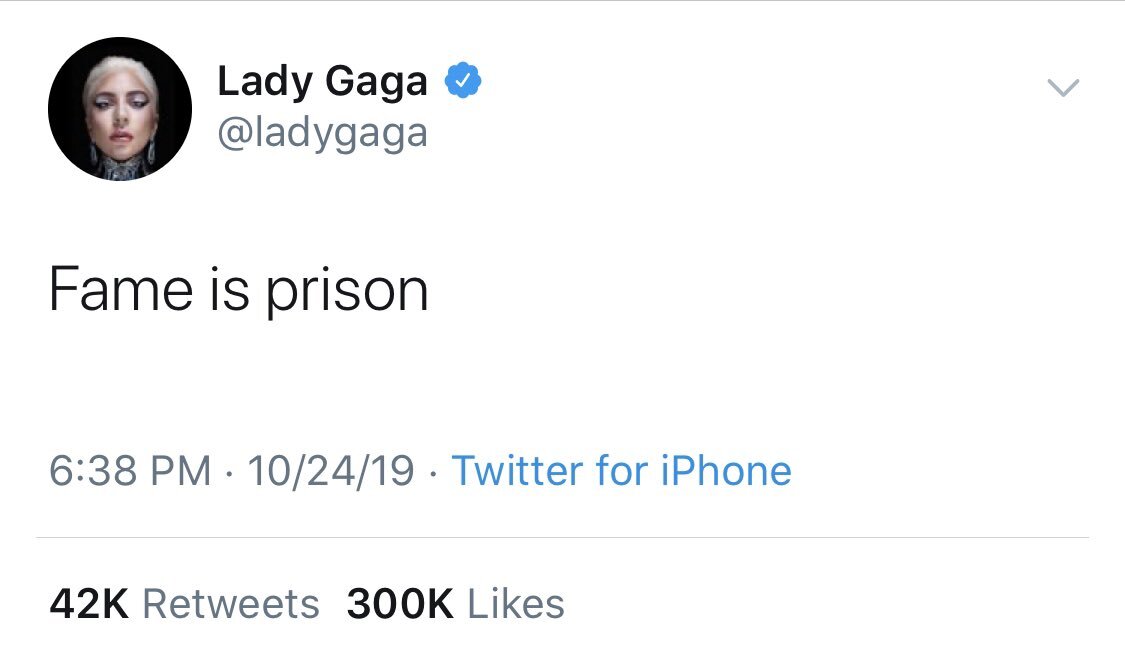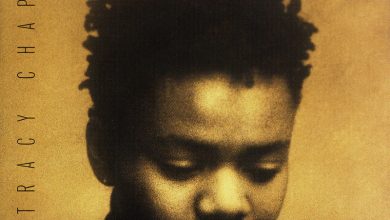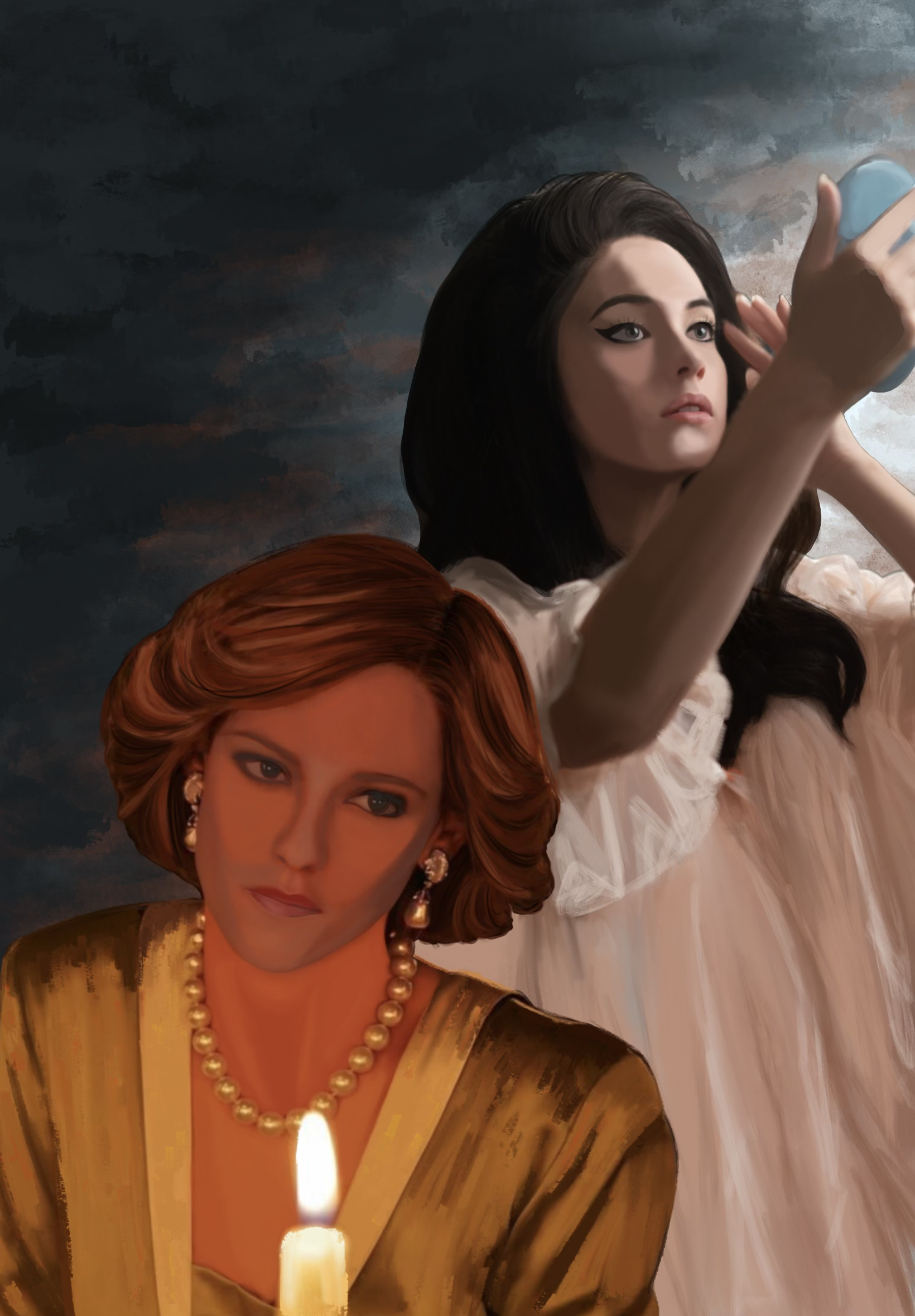Fame Is Prison: Parasocial Relationships & Marginalized Identities

Image description: Screenshot of @ladygaga’s now-deleted post from Twitter, 2019.
Image credits: @ladygaga on Twitter
On February 24th, 2022, Mistki composed a Twitter thread in an attempt to express an intricate set of feelings to her fans and concert-goers. She begins addressing her followers directly, “I wanted to speak with you about phones at shows.” Mitski goes on to reveal the various ways in which a phone held between her and her concert-goers can disrupt the intimate connection that she strives to establish during her sets. She says, “I love shows for the feeling of connection, [we] have a brief miraculous moment of being alive at the same time,” but a brigade of screens, she explains, “makes me feel as though those of us on stage are being taken from and consumed as content.”
She assures that her opinion means no harm for current fans who wish to enjoy the night as they wish, denoting her thread was meant to articulate her desire to “experience magic at a show. But [it can] only [happen] if we’re there to catch it.”
Nevertheless, the tweets received some backlash. One tweet that garnered mild support written by user @MicheleeR5100 said: “Bestie that’s great & all, but some of us have mental health issues that cause dissociation & i film to remember the moment.” Masses of Mitski fans came to defend the artist’s boundaries, including individuals with dissociative disorders, resulting in a long line of responses to Michelle’s (@MicheleeR5100) qualm, even after Mitski deleted her initial tweet.
The backlash to the backlash raised various important questions to be explored when it comes to modern society’s execution of parasocial relationships, and especially what that could mean for performers with marginalized identities. For instance, Twitter user @barking4mistki responded to Michelle’s tweet with “why do ya’ll treat woc like pets who perform party tricks at your disposal. ik [I know] for a FACT you wouldn’t be talking this way towards a white man.”
The Tweet brings up an interesting observation worth examining, such as the nature of parasocial relationships and how this may be affected by a performer’s race, gender, sexual orientation, etc. In Mitski’s situation, it seems as though fans expect her to fulfill a relationship that would be damaging to her in ways that aren’t expected from white, male performers. By looking closer into parasocial relationships fostered by social media, and fandom, we can uncover a complex web of intimacy, expectations, and identities between performer and audience member.
The term “parasocial relationship” was coined by sociologists Donald Horton and Richard Wohl. The article on the concept, published in 1956, described parasocial relationships as the interaction between performer and audience where even the “most remote and illustrious men are met as if they were in the circle of one’s peers.” In a sense, these relationships form from an audience member’s tendency to perceive their favorite televised performer as a close friend with repeated media exposure.
Julius Matthew Riles’ and Kelly Adam’s 2021 study on parasocial relationships revealed the ways in which these relationships are often “ego-driven,” a term that refers to how an audience member understands their social value through the eyes of the performer. The performer fulfills this role by providing reassurance and affection to their fans
This process is particularly important to those who struggle developing their self-concept without the aid of a virtual community. These individuals use social media sites like Twitter and Tumblr as an effective way of creating communities that appreciate, rather than reject, their differences. Thus, this practice can become especially important for marginalized individuals – queer users, people of color, and those dealing with mental illness – who use parasocial relationships as a means of maintaining a safe space for the practice and learning of social and romantic relationships.
Unfortunately, it is often fans from more privileged backgrounds that take advantage of this intimacy in the form of unrealistic expectations that would put a strain on any relationship. In the instance of Mitski’s Twitter discussion, it was mostly white users that felt they were being treated unfairly by the performer. Yet, a fan’s desire is not a performer’s responsibility to satiate, particularly if it requires a compromise of their own well-being.
That’s why it is imperative that individuals from places of privilege understand the ways in which their behaviors may impact their favorite artist. The consequences of a dysfunctional parasocial relationship on marginalized performers manifest rather negatively than if the figure was white, male, and young. Power structures may continuously uphold white, male performers if they are rejected by public opinion, but marginalized individuals like Mistki are more likely to rely on their fans for intimacy and financial stability.
Working with these concepts so far, it is no wonder that the expectations and roles of a performer and fan within a parasocial relationship have become increasingly muddled in social media, resulting in conflicts such as Mitski’s Twitter discourse. Sites like Twitter, Instagram, and TiKTok allow celebrities to directly satisfy, or neglect, their fan’s expectations. Celebrities that interact with their fans frequently, especially in a manner of disclosing personal feelings and thoughts, are more likely to look to their fans to maintain their own self-concept and well-being. Yet, while fans mainly look to one elusive figure for a sense of identity, artists must deal with the inconsistencies and tumultuous behaviors of their audience members. This group of individuals — unlike within more personal relationships — aren’t expected to respect the performer, but nonetheless control the performer’s popularity, reputation, and overall livelihood.
When overwhelming expectations are placed onto marginalized performers such as Mitski, enduring inequities are exacerbated. As @barking4mistki pointed out, it is unfair to expect women of color to perform for your every request when the same is not expected from white, male celebrities. Furthermore, Mitski has previously expressed her struggle with writing and performance as an exhaustive process, articulating her desire to exit the industry in a matter of time.
Thus, it is crucial you’re not reinforcing a power structure that perpetuates harm by putting pressure on intimacy within a world where marginalized fans and performers already struggle to find peace and belonging. Many other power structures already ensure privileged groups will always have space for belonging and esteem.
Mitski’s tweets serve as an important reminder that the glass ceiling shattered with the increasing popularity of female artists can be a mere trick of smoke and mirrors. No amount of glamor and fame is going to change the negative impact of consumer culture and whiteness on marginalized individuals as long as they’re forced to work within a capitalistic framework. As consumers, audiences have the decision to either uphold the capitalistic relationships that treats performers as commodities or consistently disrupt it, meeting them as people equally in need of community, intimacy, and connection — overall fostering a space for marginalized individuals to find belonging and understanding.




